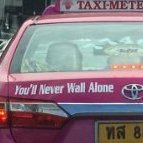Govt Urged To Revoke Traffic Victims Act
-
Recently Browsing 0 members
- No registered users viewing this page.
-
Topics
-
-
Popular Contributors
-
-
Latest posts...
-
56
Middle East Netanyahu Pushes for Military Action to Free Hostages
They are adding to the number daily. Over 100,000 have been injured and about 60,000 dead already. -
174
KPlus is now almost useless to me after 4 years without issues they impose this on me
Exactly - every customer is treated differently and nationality is irrelevant - it's not only foreigners, but also Thai nationals who are affected. I was told yesterday (5 Aug) by the call centre people that the decision is based on pattern of account usage: I've had a Kbank account for more than 10 years. Use it mainly as a savings account so paying in more than paying out, but in last few months made several transfers to other banks for amounts well over 50K. As of some time last month (July) can only send 50K A DAY. Have been told I can increase the limit upon request via call center but new limit will only be valid for 30 days then will revert to 50K/day. No current way to make a higher limit permanent. I complimented KBank on their work to encourage money laundering and tax evasion, as it's perfectly okay to go to a branch and withdraw say 250K in cash, to then be used in ways that are much harder to trace than electronic payment ... fools. Many small businesses are very happy to be paid in cash. Nothing to do with phone number / passport - see above. I have Thai nationality and same phone number for 25 years. -
31
Report Grab Targets Thailand's Expats with New Perks and Features
Cue Thais complaining about farangs getting preferential treatment with "Grab Expat Pass" and unfair THB 2000 discounts. -
56
Middle East Netanyahu Pushes for Military Action to Free Hostages
I used to but seeing how the Jews in Israel have treated the women and children of Gaza it has changed my mind. -
23
USA Trump’s Odd Speeches Raise New Doubts About His Mental Acuity
He right about wind turbines killing wildlife and wrecking the scenery. They are an abomination and totally unnecessary...... but a vital prop for the geoengineering climate change shamsters.- 1
-

-
374
Will Trump's "war on facts" eventually catch up with him?
Woosh, that went right over your head.
-
-
Popular in The Pub








Recommended Posts
Create an account or sign in to comment
You need to be a member in order to leave a comment
Create an account
Sign up for a new account in our community. It's easy!
Register a new accountSign in
Already have an account? Sign in here.
Sign In Now